
Jeff Gitterman interviews noted climate experts, including several of our SMART Climate UMA (Unified Managed Account) partners. Check out these videos to hear from diverse voices leading the way to a more sustainable future.

Climate Risk Scientist Dr. Kimberley Miner joins Jeff to discuss why the capital markets should be concerned about the risks of climate change. Dr. Miner shares her research on the arctic poles and how climate risk has the potential to affect large ecosystems. She also talks about the current state of forecasting, how the domino effect of environmental impacts happens within interrelated systems, the implications of climate change on the commodities market, and shares several additional climate risk information resources.
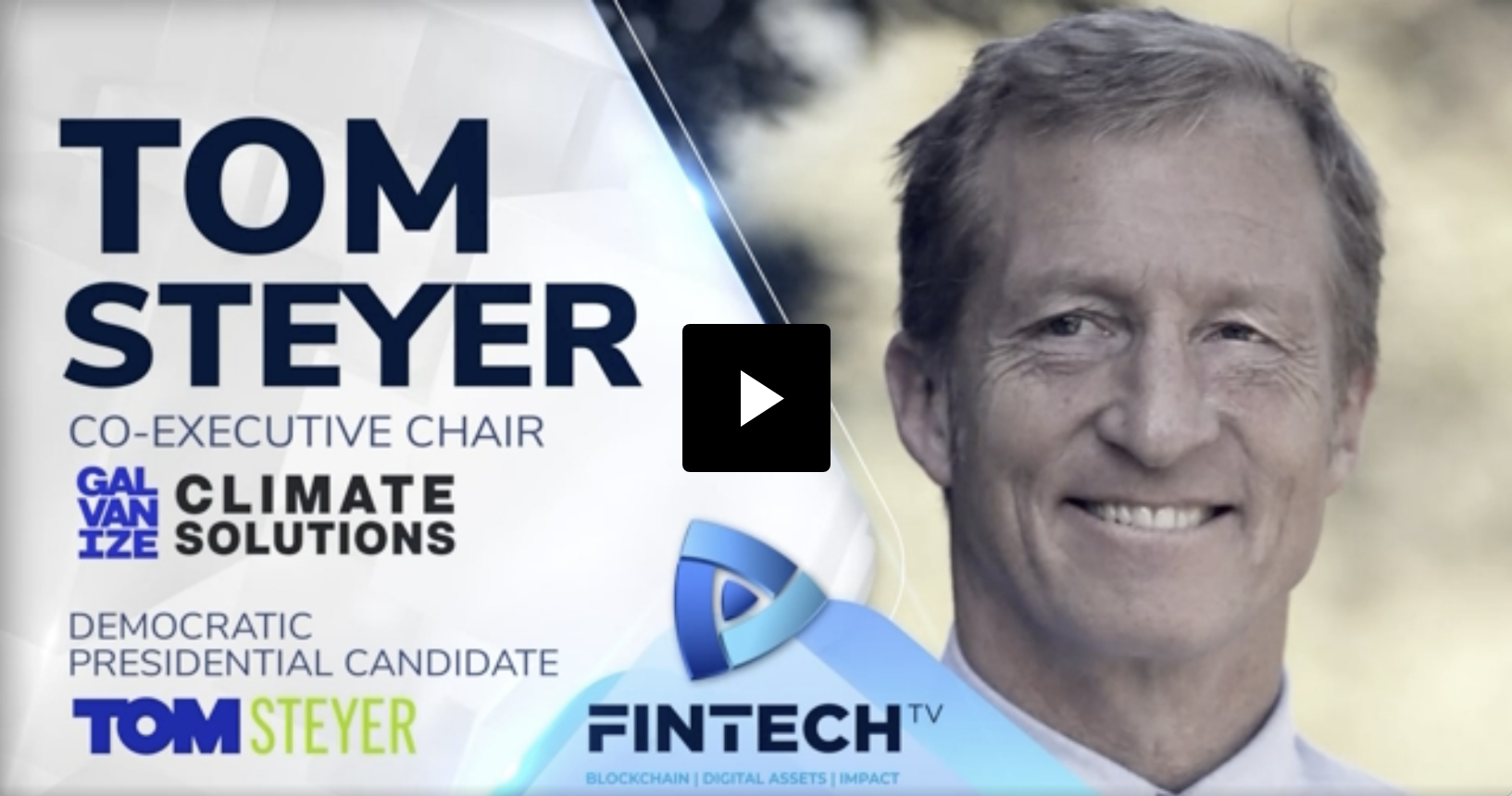
“Transition finance” refers to financing that promotes long term, strategic greenhouse gas reduction initiatives. In this interview, Jeff sits down with Tom Steyer, Co-Executive Chair at Galvanize Climate Solutions and former Democratic Presidential Candidate, to talk about proposed SEC regulations on climate disclosures, transition finance for a green economy, the Inflation Reduction Act, how we can make a successful switch to renewable energy, and more on what it will take to combat climate change.
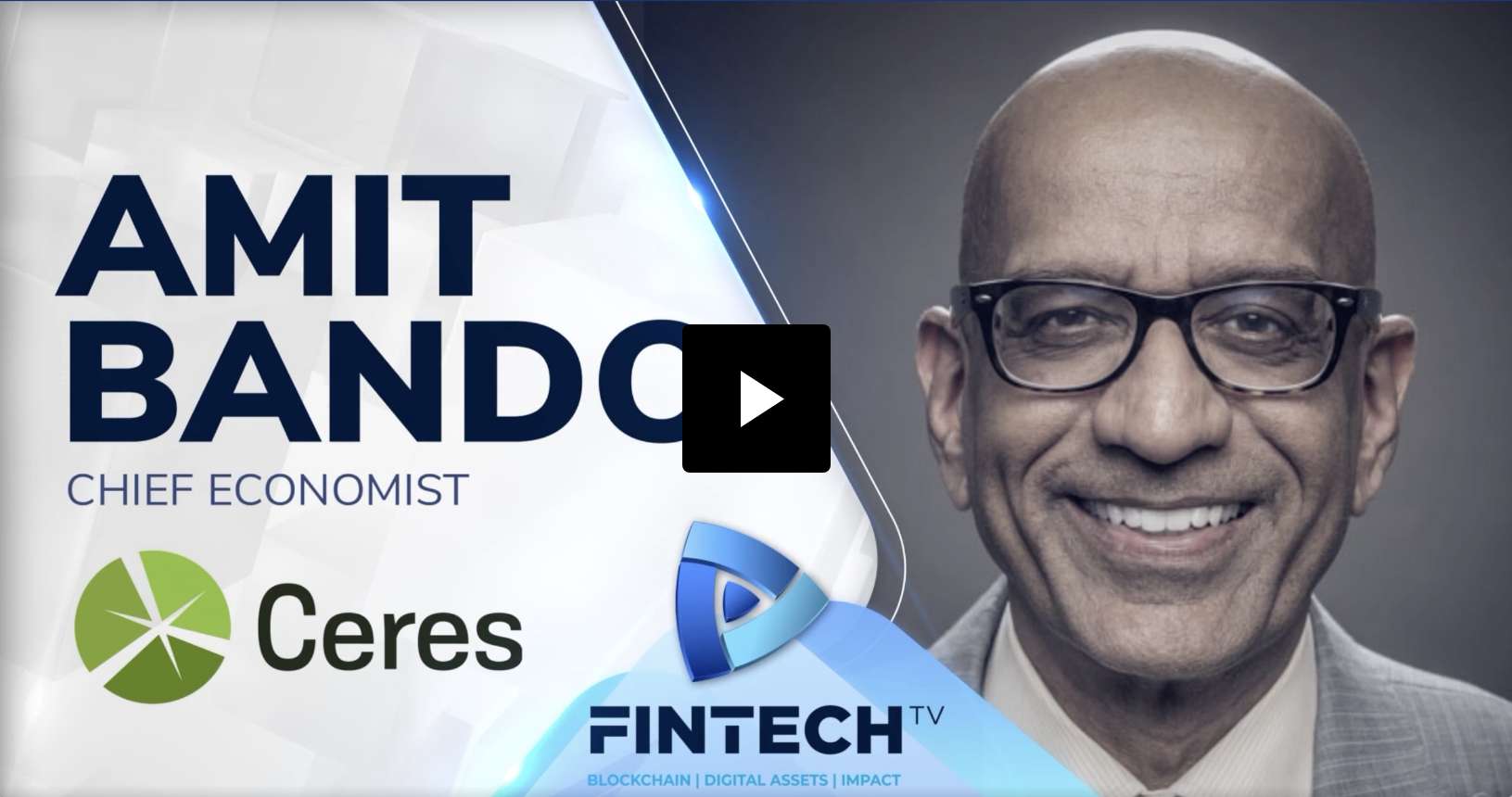
The term “just transition” refers to many of the social issues that relate to and are impacted by decisions related to climate change, such as workers rights and community rights, particularly in marginalized communities, who are often most affected by the negative effects of a changing climate. Amit Bando, Chief Economist at Ceres, joins Jeff to discuss financing just transitions, and how the IRA bill can offer additional support.
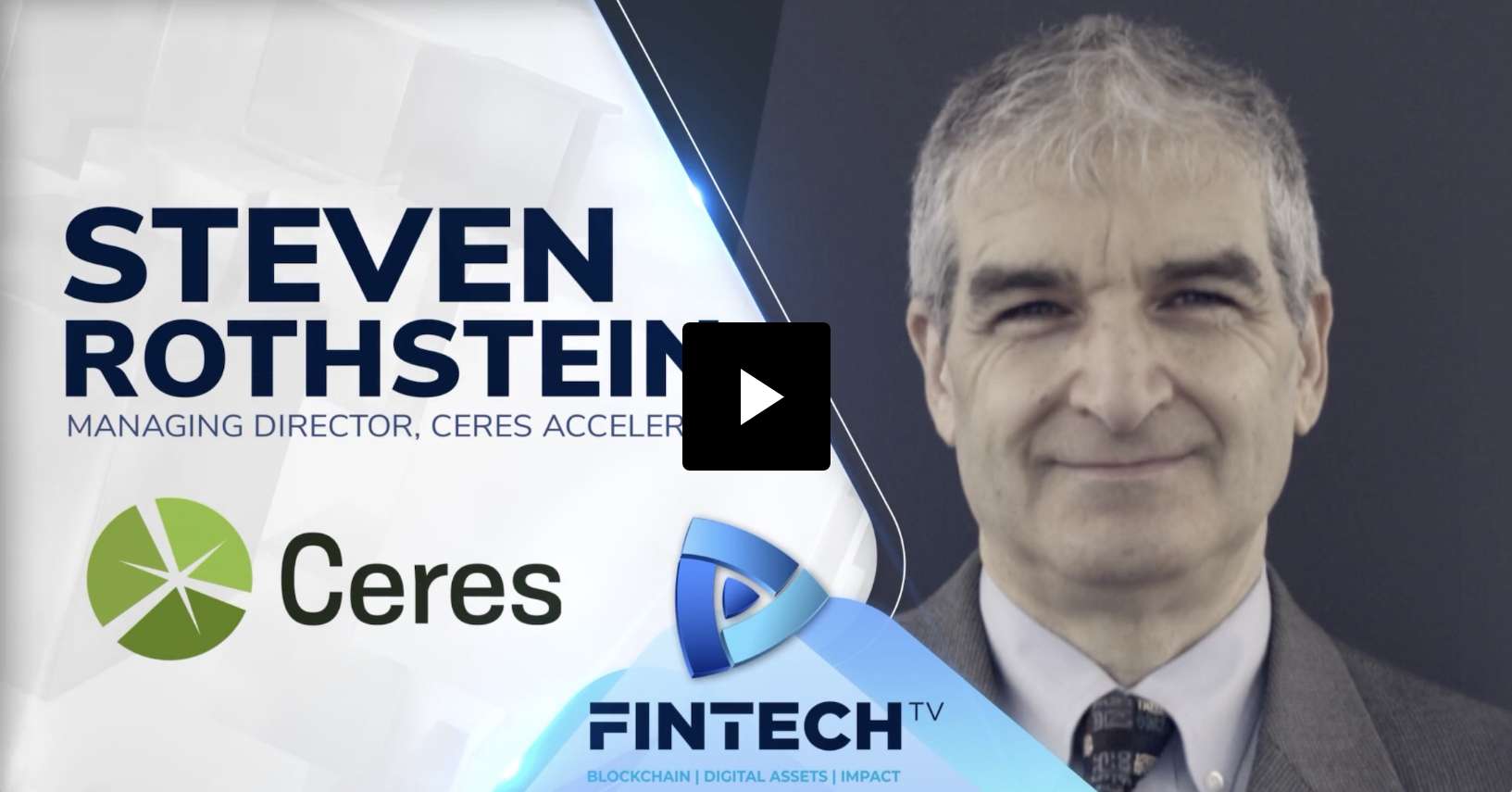
Bankers and insurers are often hesitate to address climate change because of perceived risks. Yet, with the right tools and knowledge, it is possible for them to mitigate these risks while also making progress on climate action. Steven Rothstein, Managing Director at Ceres Accelerator, talks about how climate change is a pressing global issue, and that it is time for the banking and insurance industry to step up and address its role in climate mitigation.
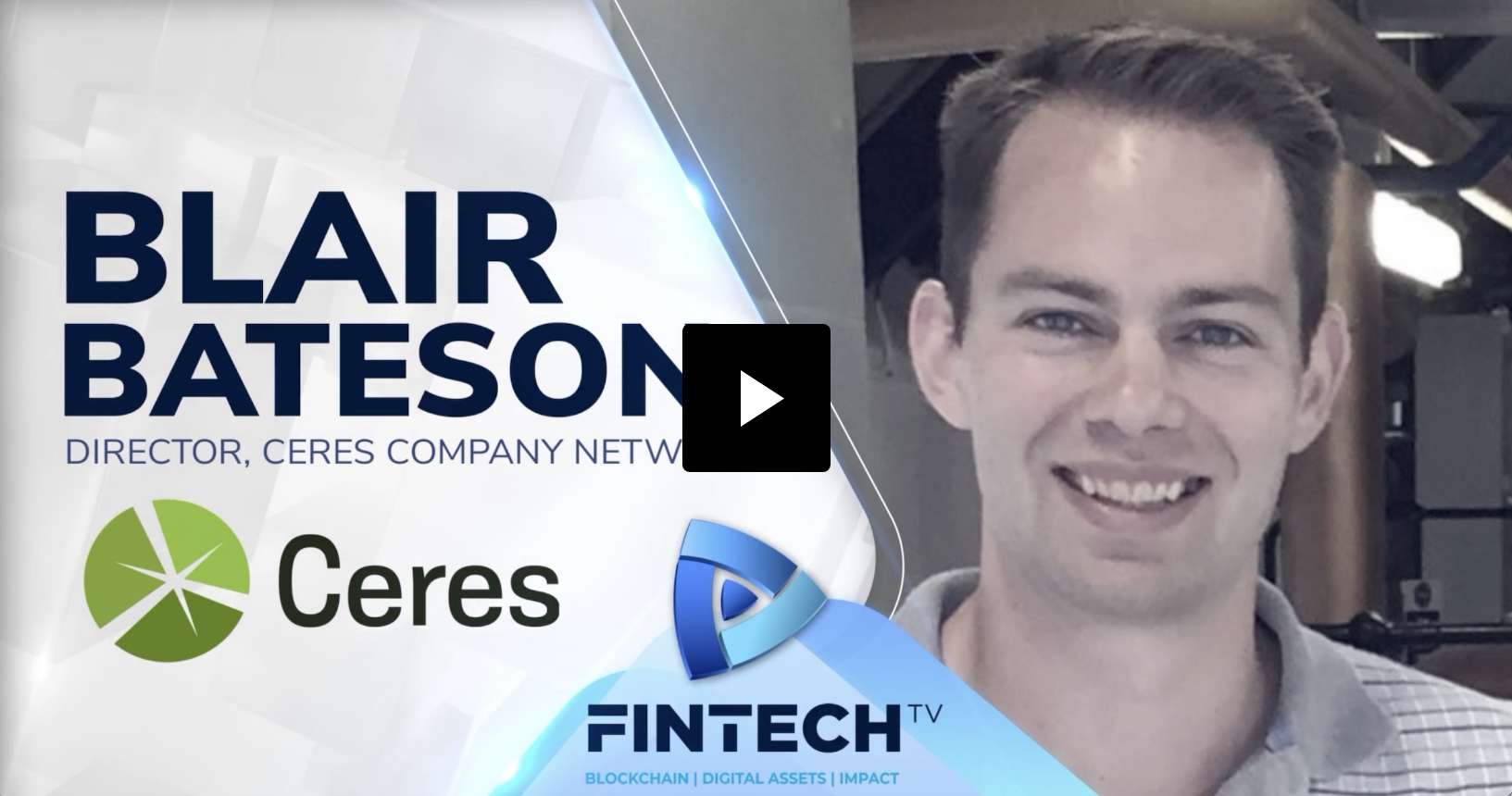
Climate risk is increasingly becoming associated with financial risk. Blair Bateson, Director at the Ceres Company Network, joins Jeff to talk about how climate risk is affecting the banking and insurance sectors, how companies are addressing climate risk as a material business risk, and the importance of a just transition in the fight against climate change.
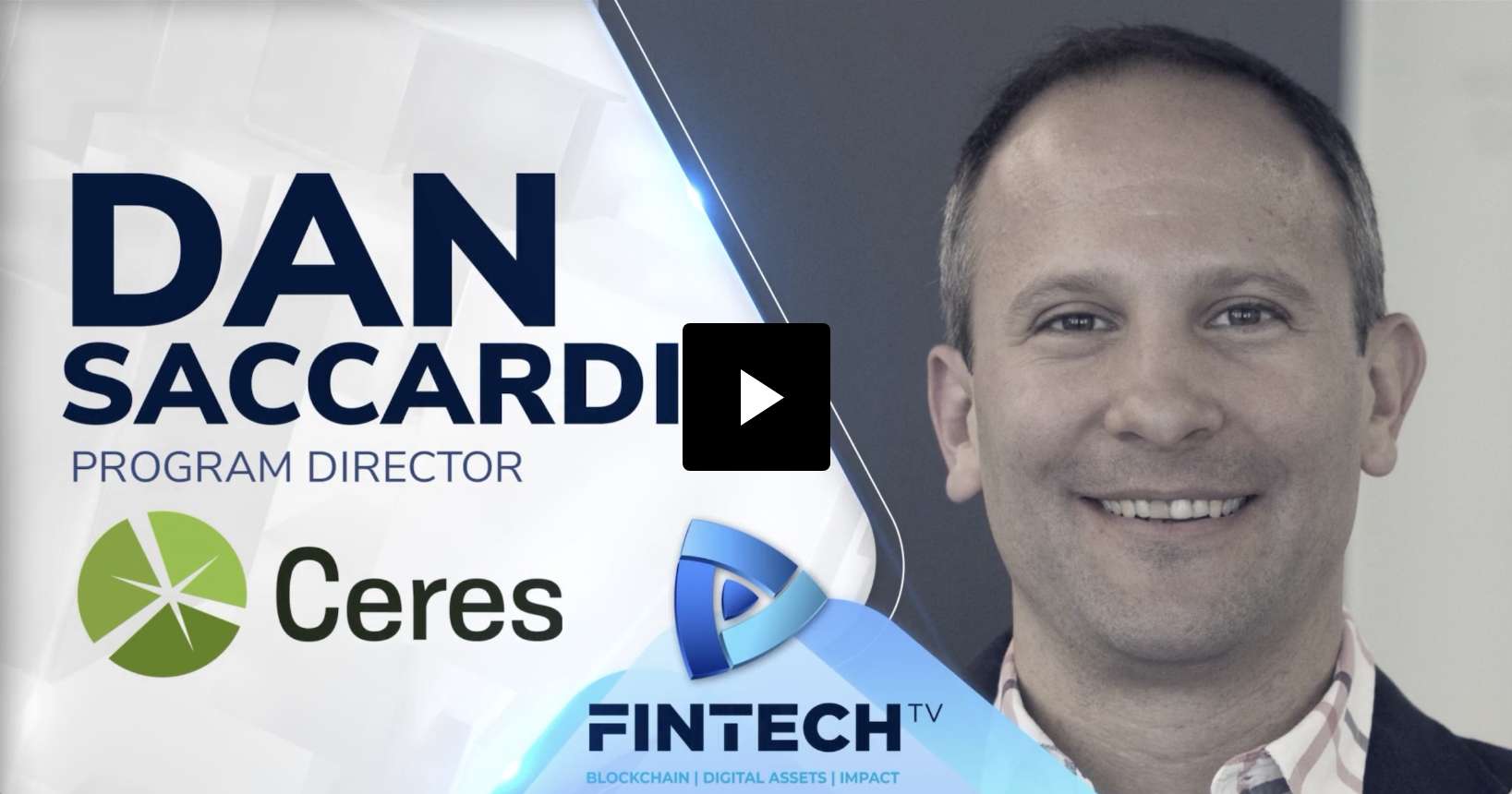
Dan Saccardi, Program Director at Ceres, talks with Jeff about how companies can adapt and move forward in a transitional economy, available opportunities that exist in this climate transition and with the passing of the IRA bill, how companies can invest long term despite potential risks, and how Ceres is helping companies understand the impact of climate change on their customers.
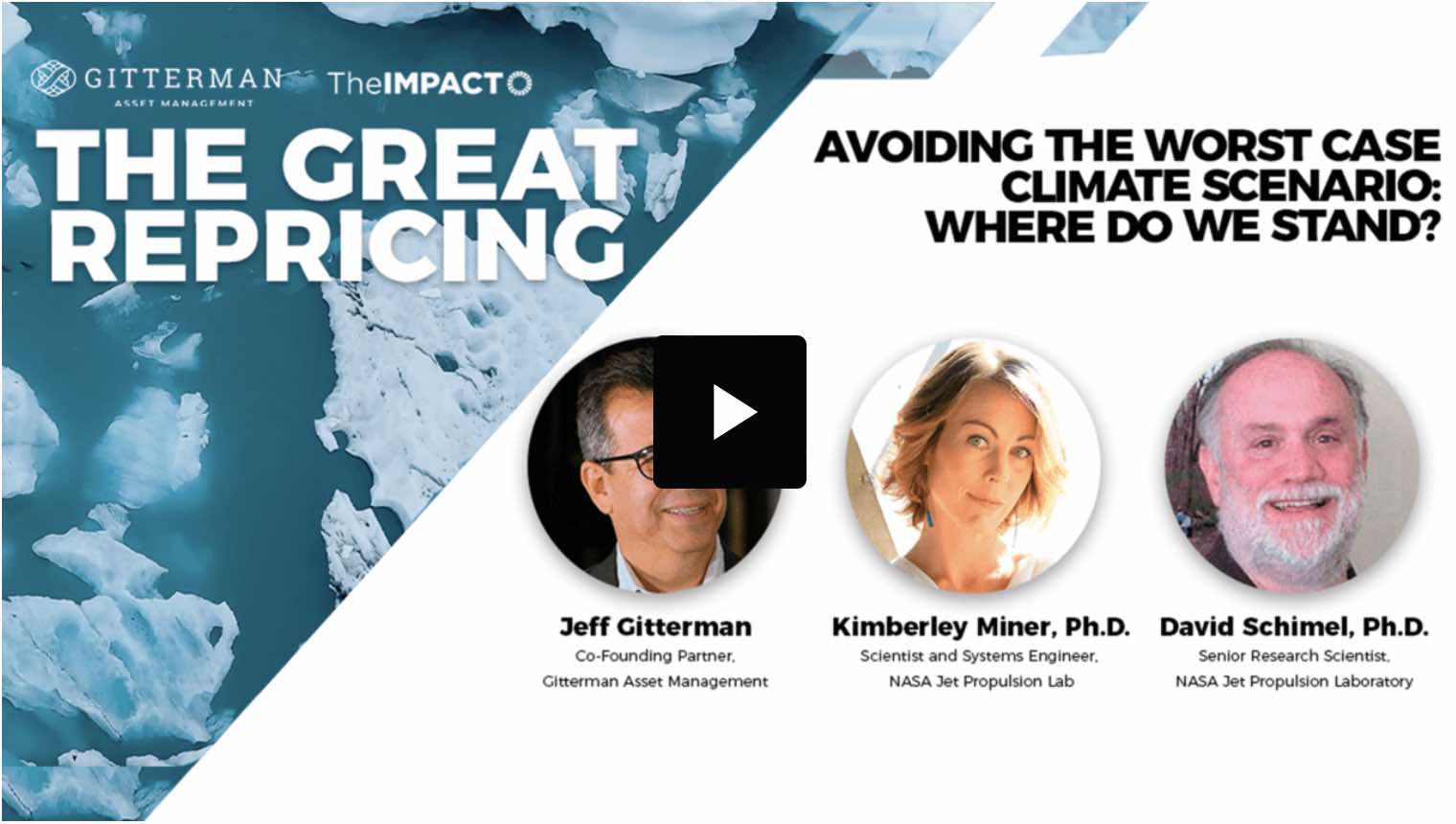
The increasingly acute impacts of climate change are felt everywhere. From hurricanes, to flooding, to severe droughts, to wildfires, and extreme heat, all regions are impacted. In this session, leading climate scientists Dr. David Schimel and Dr. Kimberley R. Miner share insights into the latest climate science, the additional risks we face as we head towards dangerous tipping points, and their messages to governments, the private sector, and civil society.
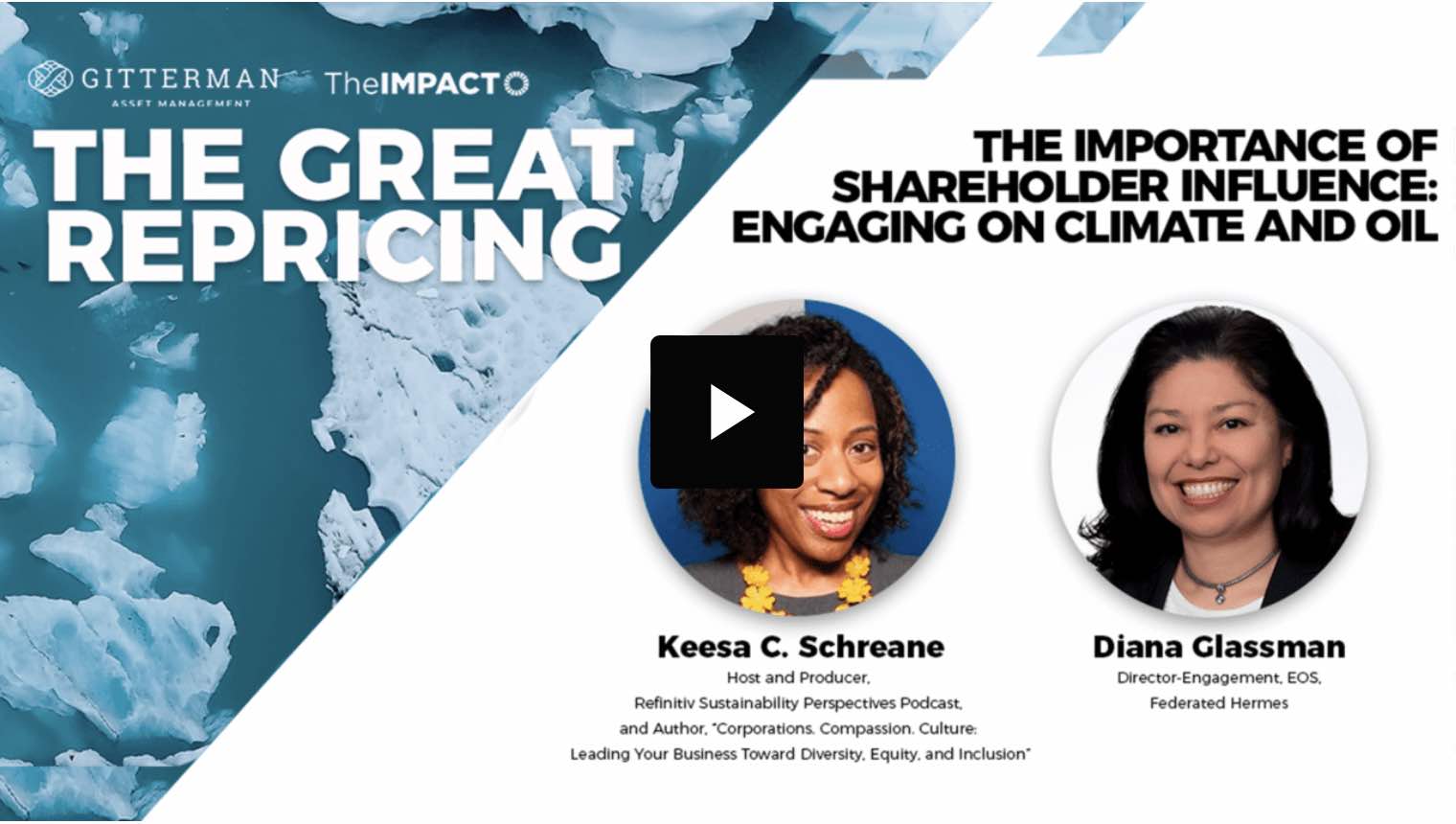
Institutional investors increasingly undertake engagement with the companies they own or in which they hold debt to influence their overall direction, especially with respect to ESG issues. Federated Hermes has found that successful engagement can reduce risk, particularly with respect to environmental topics. This fireside chat will explain what goes into a successful engagement and why investors might choose to engage versus divest, especially with respect to fossil fuel companies.
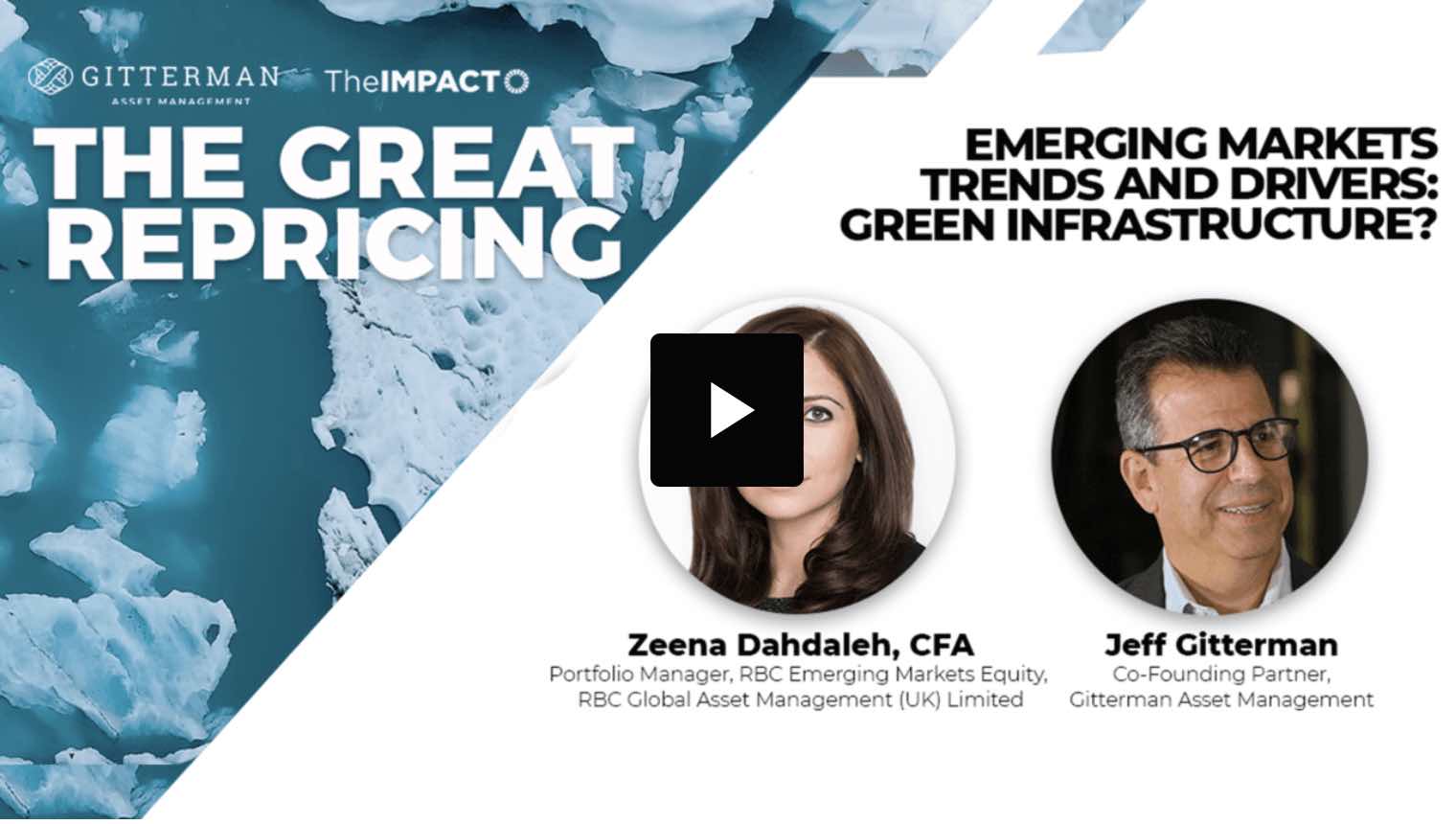
Emerging markets face particular challenges owing to their capacity to respond to risks and extreme weather events, among other factors. However, with risks also come opportunities, especially with respect to sustainable infrastructure. In this fireside chat, Jeff Gitterman talks to Zeena Dahdaleh of RBC Global Asset Management (UK) Limited about how green infrastructure is a major multi-decade theme for the firm’s portfolios, and the investment sub-themes, including electric vehicles, renewables, and transition metals, that are set to be the fastest growing within emerging markets.
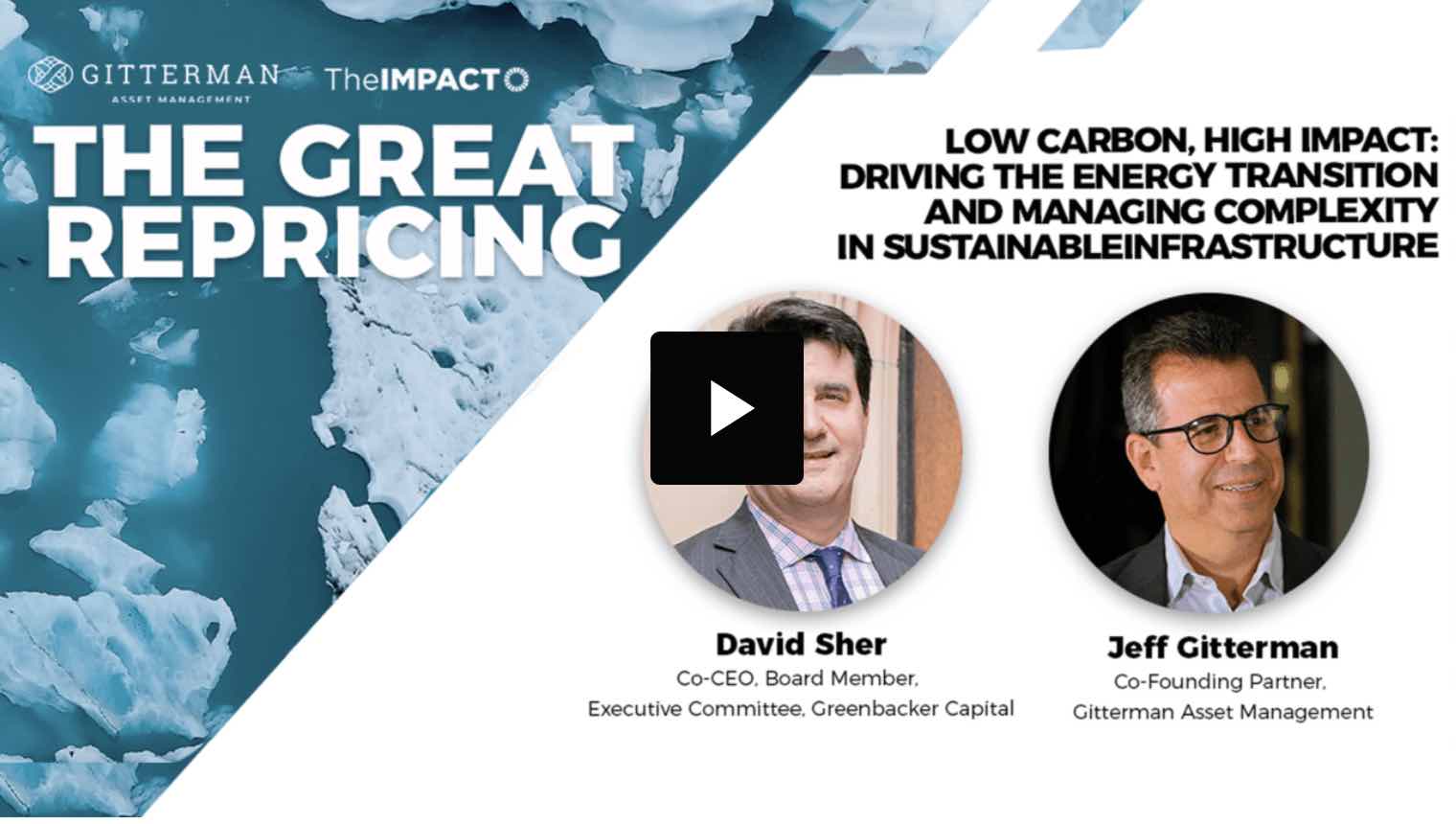
The transition to a low-carbon future necessitates rapid investment in sustainable infrastructure at a global scale. Greenbacker Capital, now celebrating 10 years in sustainable infrastructure, has brought more than two gigawatts of power to market, in 34 states, since 2011. Across its various strategies it buys and funds construction and operation of renewable energy and sustainable development projects, as well as providing creative financing to novel environmental technology. In this fireside chat, Jeff Gitterman speaks with co-CEO of Greenbacker, David Sher, to reflect on the last decade and discuss Greenbacker’s future plans operating at the confluence of multiple megatrends.
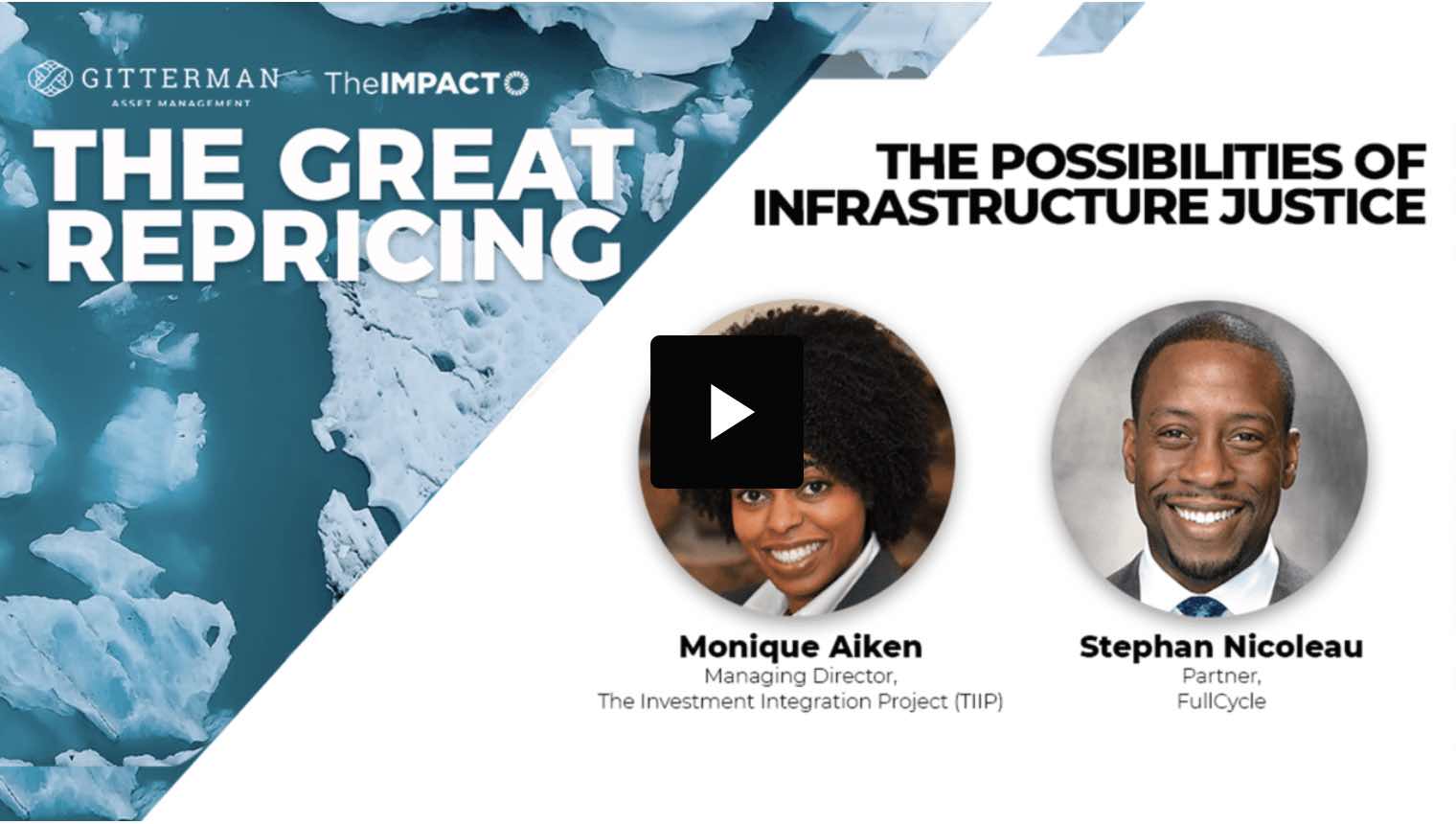
What we build, where we build, and who gets to be involved, are all critical questions that demand answers as we transition to the low-carbon future of tomorrow. In conversation with Monique Aiken of The Investment Integration Project (TIIP), Stephan Nicoleau will explain how FullCycle focuses on infrastructure that can abate the Greenhouse Gases (GHGs) with highest near-term warming potential to invest and develop solutions that accelerate decarbonization and achieve a spectrum of positive health and societal outcomes.
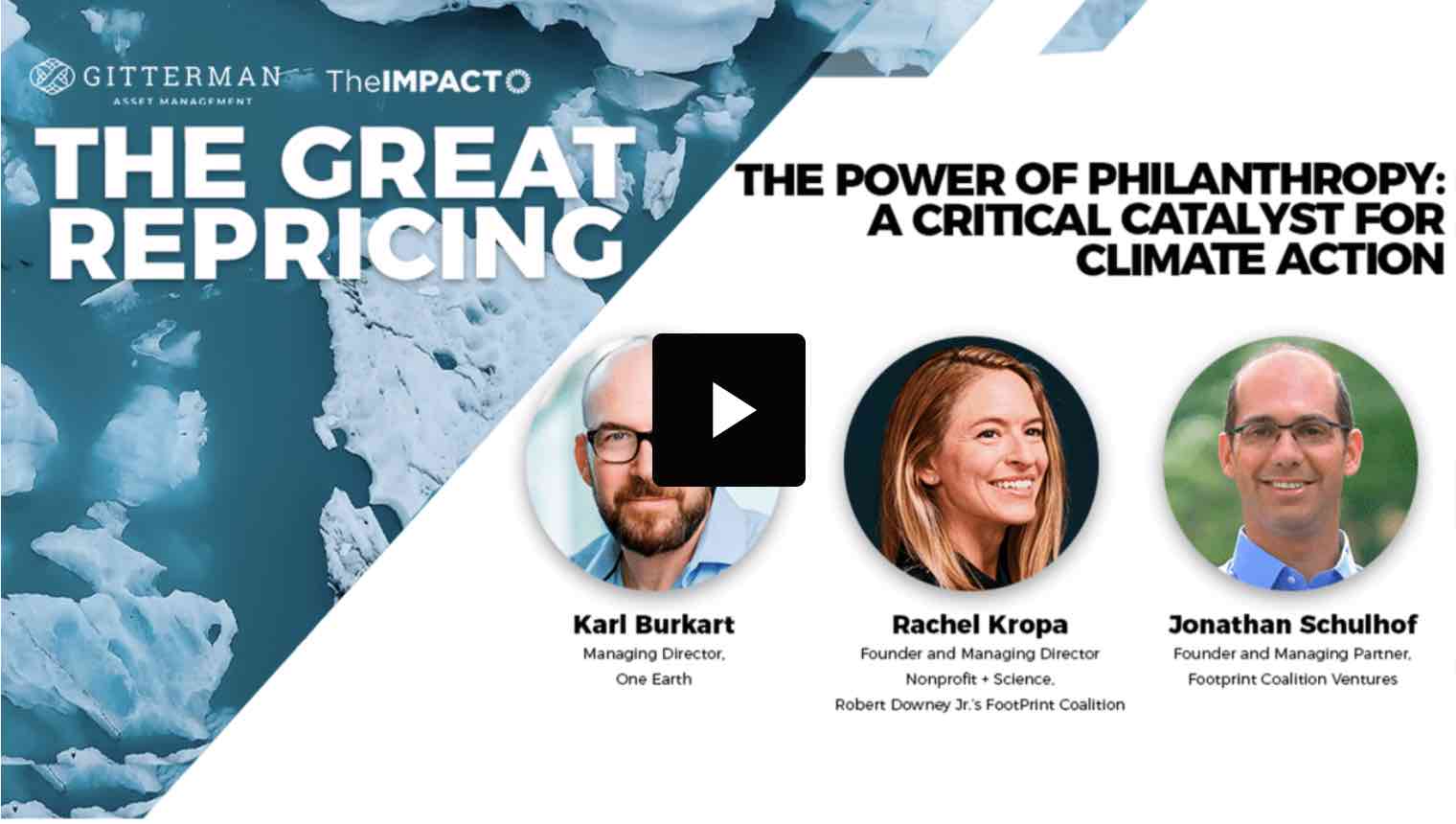
Philanthropy, which is sometimes overlooked or underestimated, has a key role to play in galvanizing science and technology initiatives that can lead to game-changing outcomes. In this session, we hear from Karl Burkart of One Earth, Rachel Kropa of FootPrint Coalition, and Jonathan Schulhof of Footprint Coalition Ventures. One Earth will share how the organization collaborates with HNW individuals and a network of scientists to create strategic grantmaking portfolios, and FootPrint Coalition will discuss its role in funding innovative climate solutions.
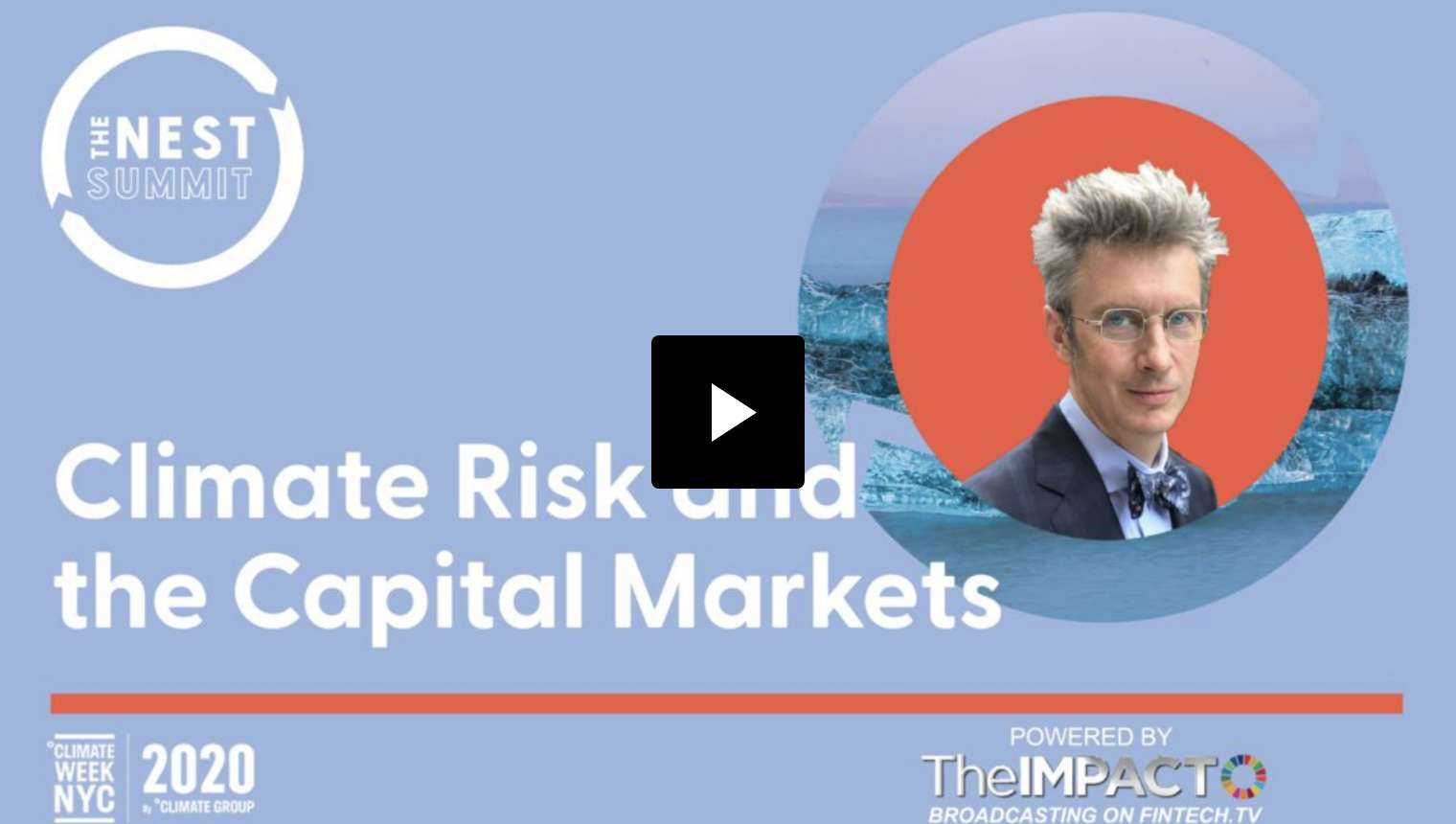
Stable capital markets are predicated on a stable world, but climate change is creating an instability that is generally not accounted for in many financial models. Spencer Glendon, Ph.D., Senior Fellow at Woodwell Climate Research Center and former Director of Investment Research at Wellington Management, helps us better understand the fundamental risks that capital markets have with respect to increasing changes in climate.
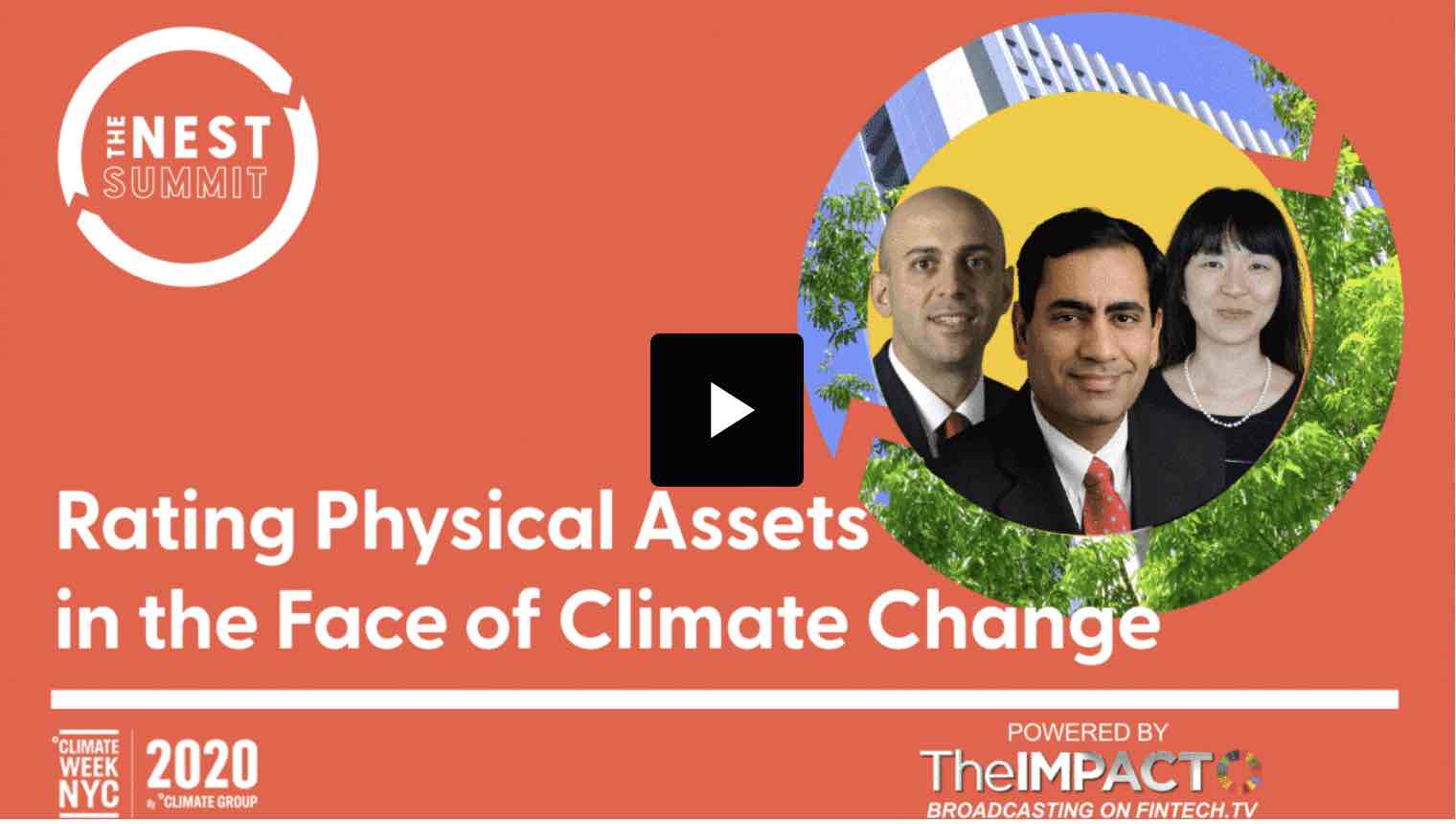
The financial markets are increasingly accounting for the transition risks of climate change. However, as historic atmospheric emissions continue to persist, the effects are cumulative, and we face significant global warming in our future. Subsequently, physical risk and adaptation are getting more attention from data providers, ratings agencies, and investors. In this video, Yoon Hui Kim from 427, Swami Venkataraman of Moody’s, and Chris Goolgasian of Wellington Management explore how advanced data analysis can pinpoint physical risks, and how translating climate science into financial metrics informs credit ratings and portfolio decisions.
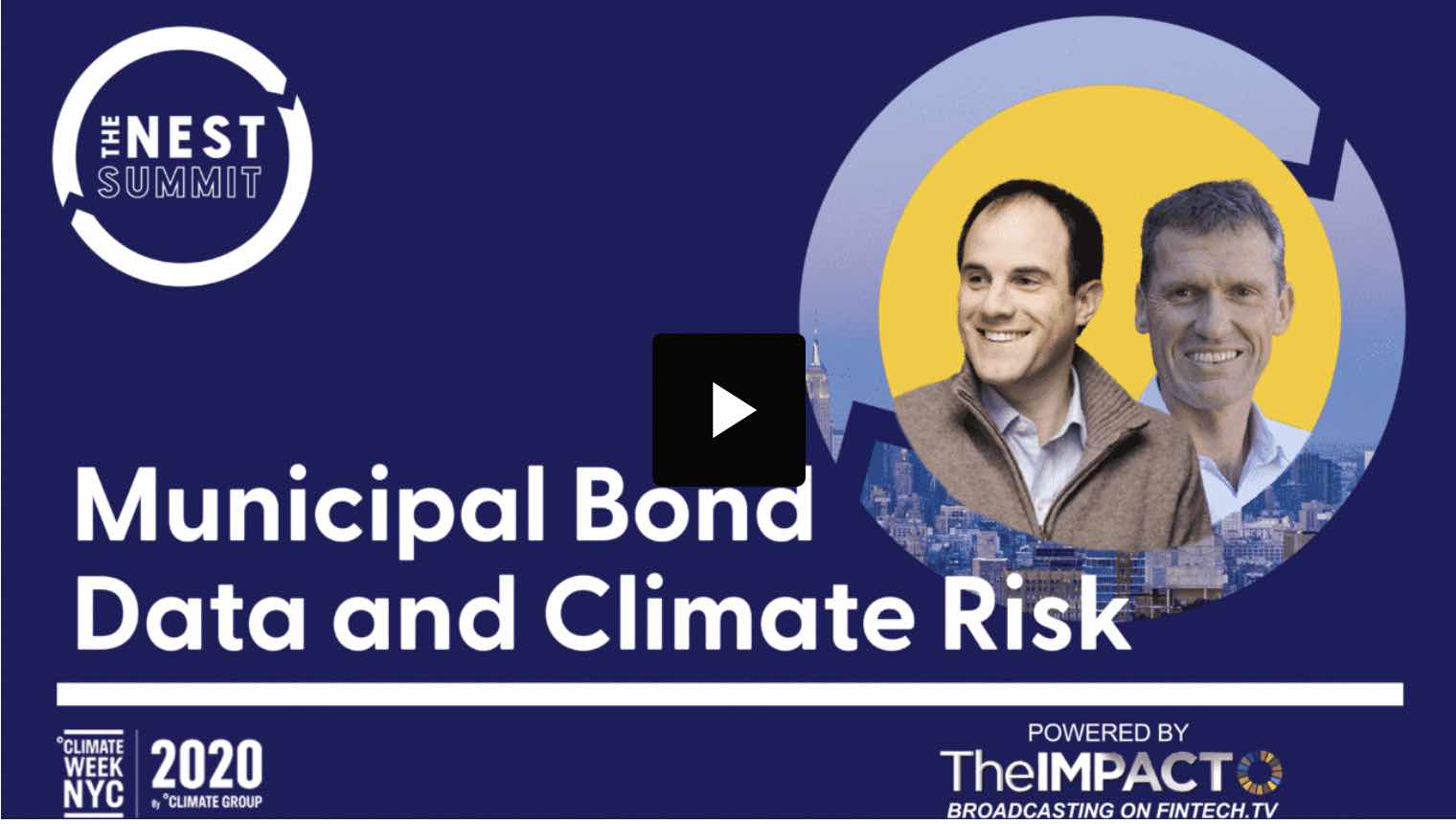
Climate data is becoming more sophisticated at a rapid rate, and risQ is no exception. With a platform that combines physical climate risk alongside geo-spatial and social data, risQ shows how specific extreme weather risks such as floods, wildfires, and water scarcity may impact the municipal bond market. Andrew Teras of Breckenridge joins Chris Hartshorn of risQ to discuss how their municipal bond strategy incorporates this data into their investment process and why short-term bondholders need to care about climate change impacts.
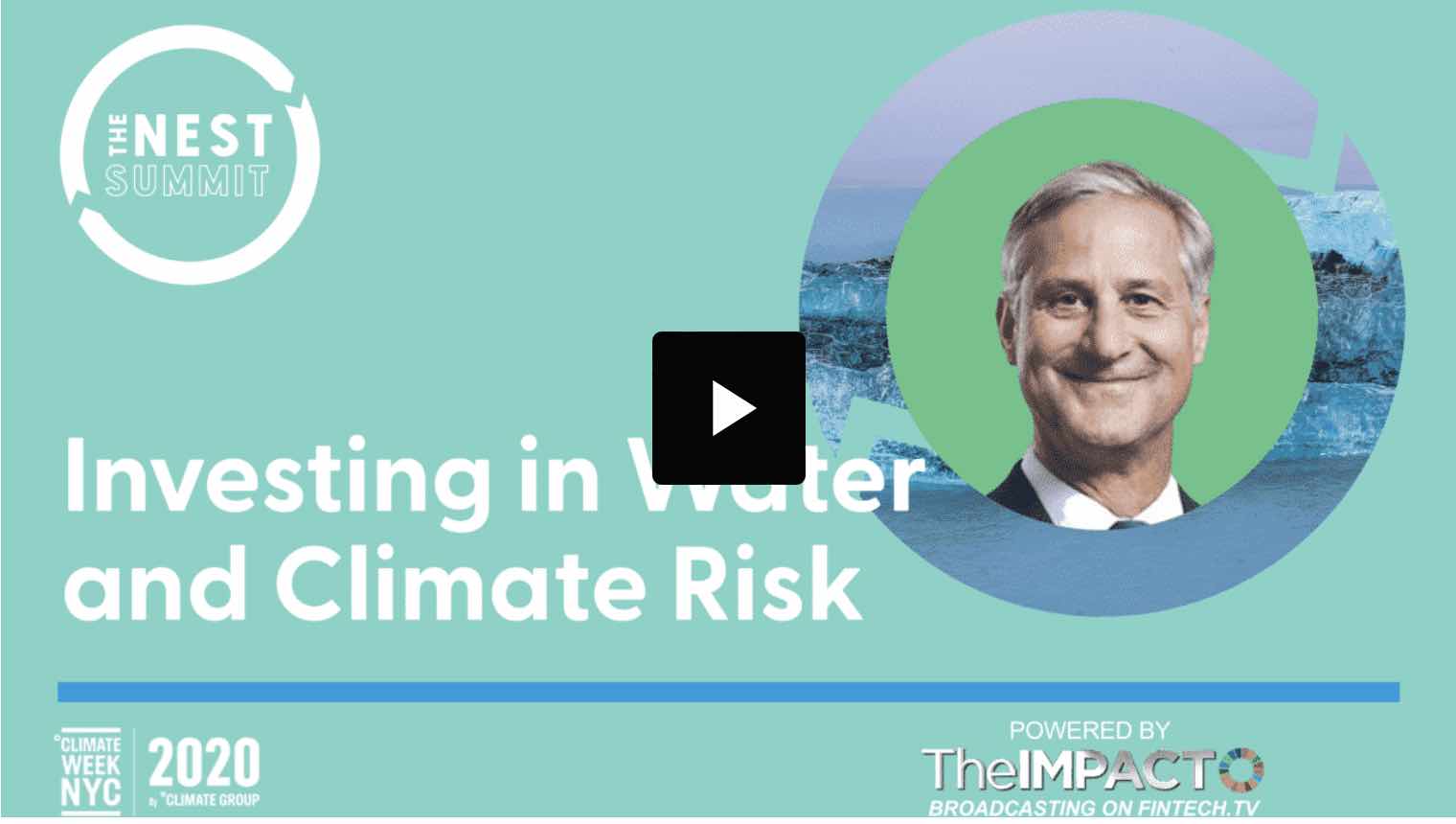
According to Matt Diserio, CEO of Water Asset Management (WAM), water is the resource that will define the 21st Century. The water industry includes some of the most enduring companies, and the sector is only going to see greater investment as climate change affects this essential resource. WAM’s simple, but profound, water-focused impact metrics allow the firm to identify the companies and solutions that will increase water availability, and wastewater treatment, and drive energy efficiency in both.
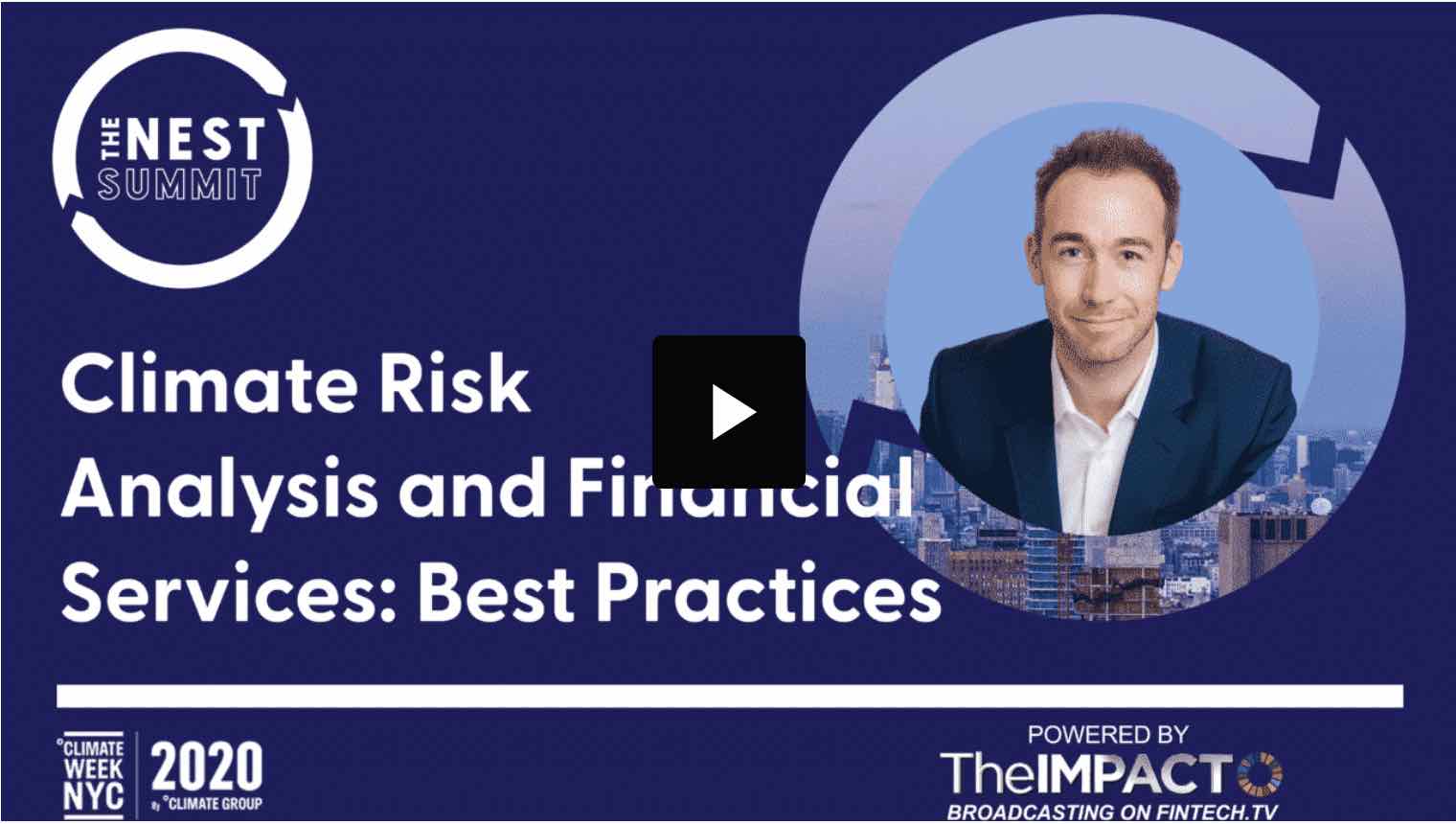
Investors and companies increasingly recognize the economic risks posed by climate change. The Climate Service, and its mission to “embed climate risk into every financial decision on the planet,” helps clients to understand how risks may unfold according to different scenarios. Globally, capital is already being allocated towards climate solutions and away from fossil fuels. Join Joseph Lake of The Climate Service to learn how the coronavirus pandemic has become a catalyst for companies looking to deepen their understanding of climate change impacts throughout the value chain, and how The Climate Service’s data offerings will evolve in the future.
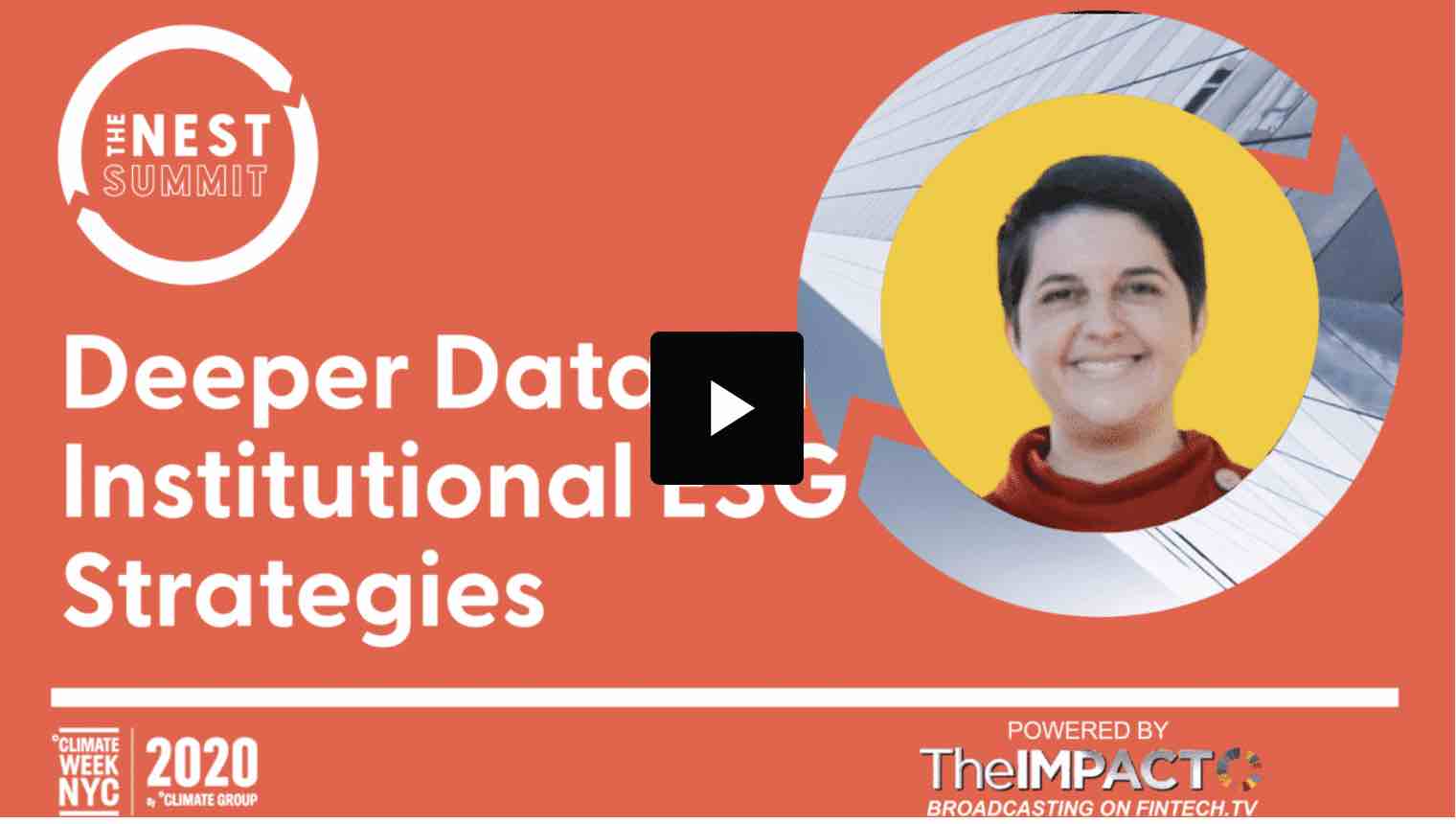
Evaluating the depth and sophistication of ESG and climate strategies requires specialist information. eVestment recently released a new questionnaire that helps institutional investors better understand the increasing amount of product available. Erika Spence shares her experience in collaborating across the ecosystem to ensure that the new questionnaire incorporates the evolving climate data landscape and the necessary nuance required for asset managers to demonstrate their differentiated philosophies and approaches.
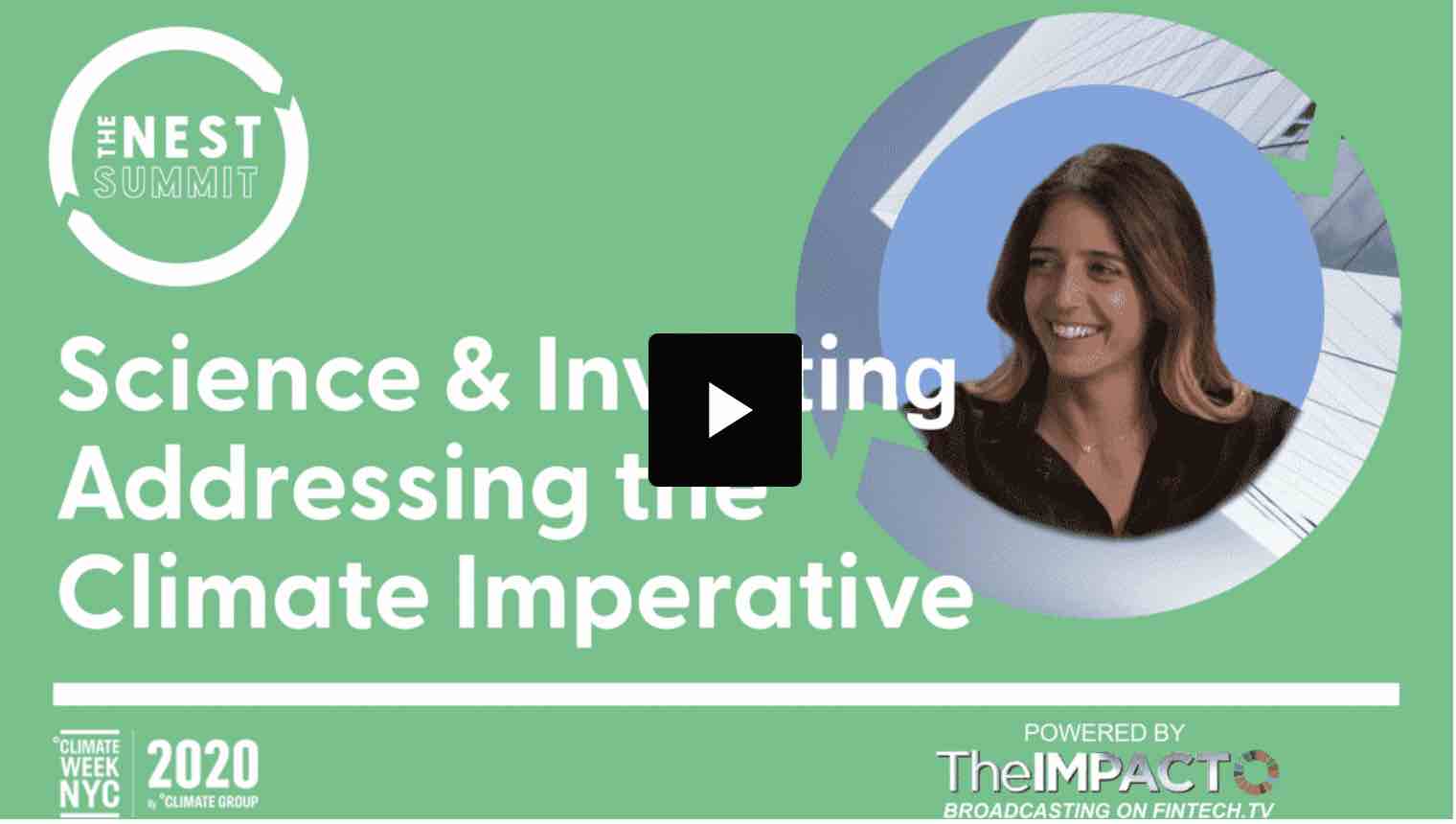
Education is fundamental to establishing the common vocabulary and understanding needed to effectively invest with a climate lens. AllianceBernstein is building critical bridges between climate science and investment professionals. Their partnership with Columbia University supports internal education across their analyst teams, and their investment in proprietary technology enables tracking metrics and engagement activities across asset classes and regions. Sarah Rosner, Director of Environmental Research & Engagement, explains the firm’s journey and successes to date, and their plans to widen the audience for their educational initiatives.
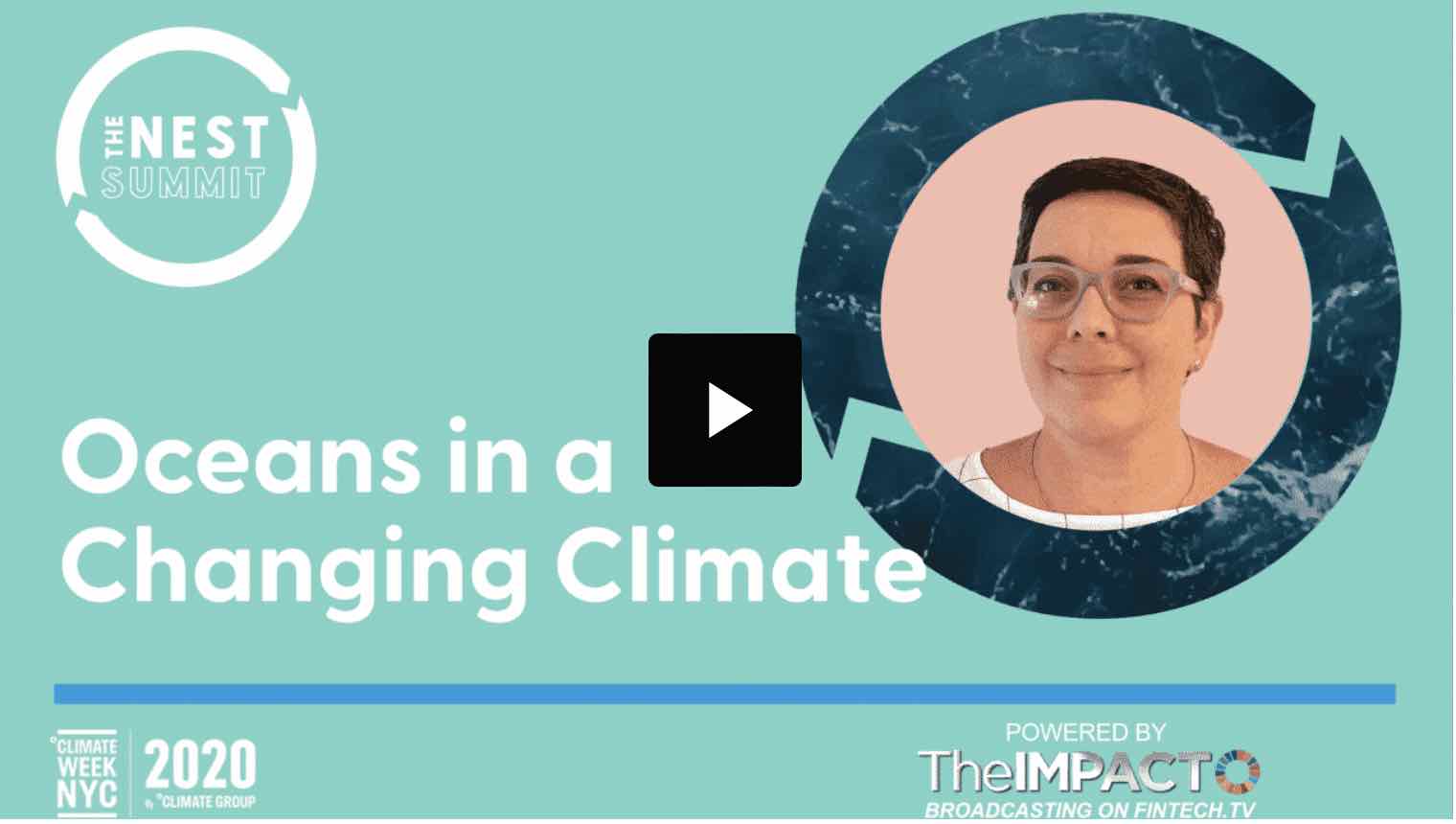
The oceans are a critical aspect of the climate system. Covering over 70% of the Earth’s surface, they have absorbed over 90% of human-driven warming. Valentina Germani is a Legal Officer at the U.N.’s Division for Ocean Affairs and the Law of the Sea. She explains the socioeconomic effects of sea level rise from ice melt and thermal expansion, and ocean acidification from carbon dioxide. Across the globe, coastal communities are affected by declining fish populations, land erosion, chronic flooding, and loss of revenues from tourism. In addition, some cultures find their spiritual sites and way of life at risk.
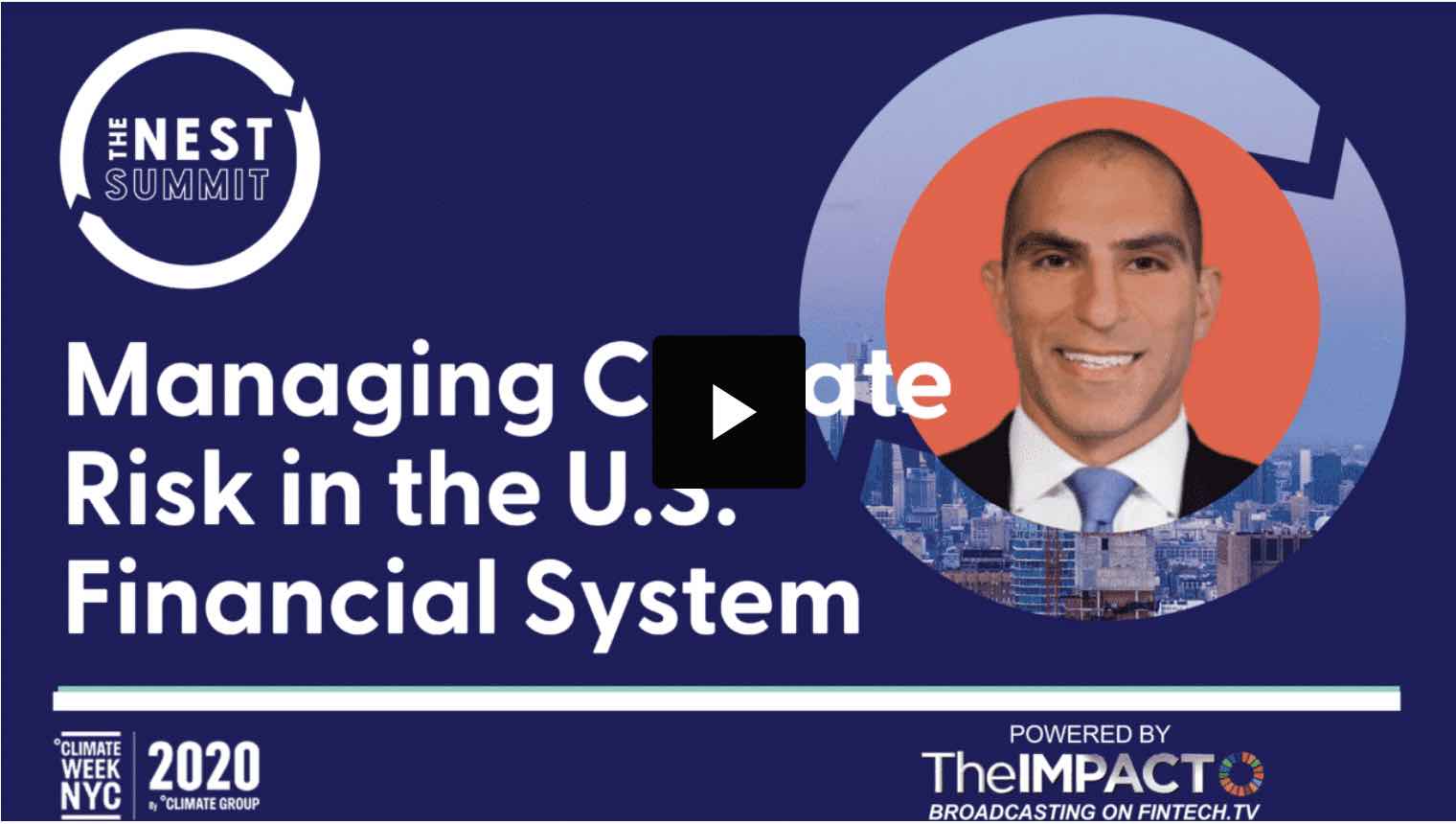
In September 2020, the Commodity Futures Trading Commission (CFTC) released a groundbreaking report, “Managing Climate Risk in the U.S. Financial System.” Calling for a carbon price, among other measures, the document stated that, “U.S. financial regulators must recognize that climate change poses serious emerging risks to the U.S. financial system, and they should move urgently and decisively to measure, understand, and address these risks.” CFTC Commissioner Rostin Behnam talks about his climate change journey and the importance of building broad coalitions to catalyze collaborative action.
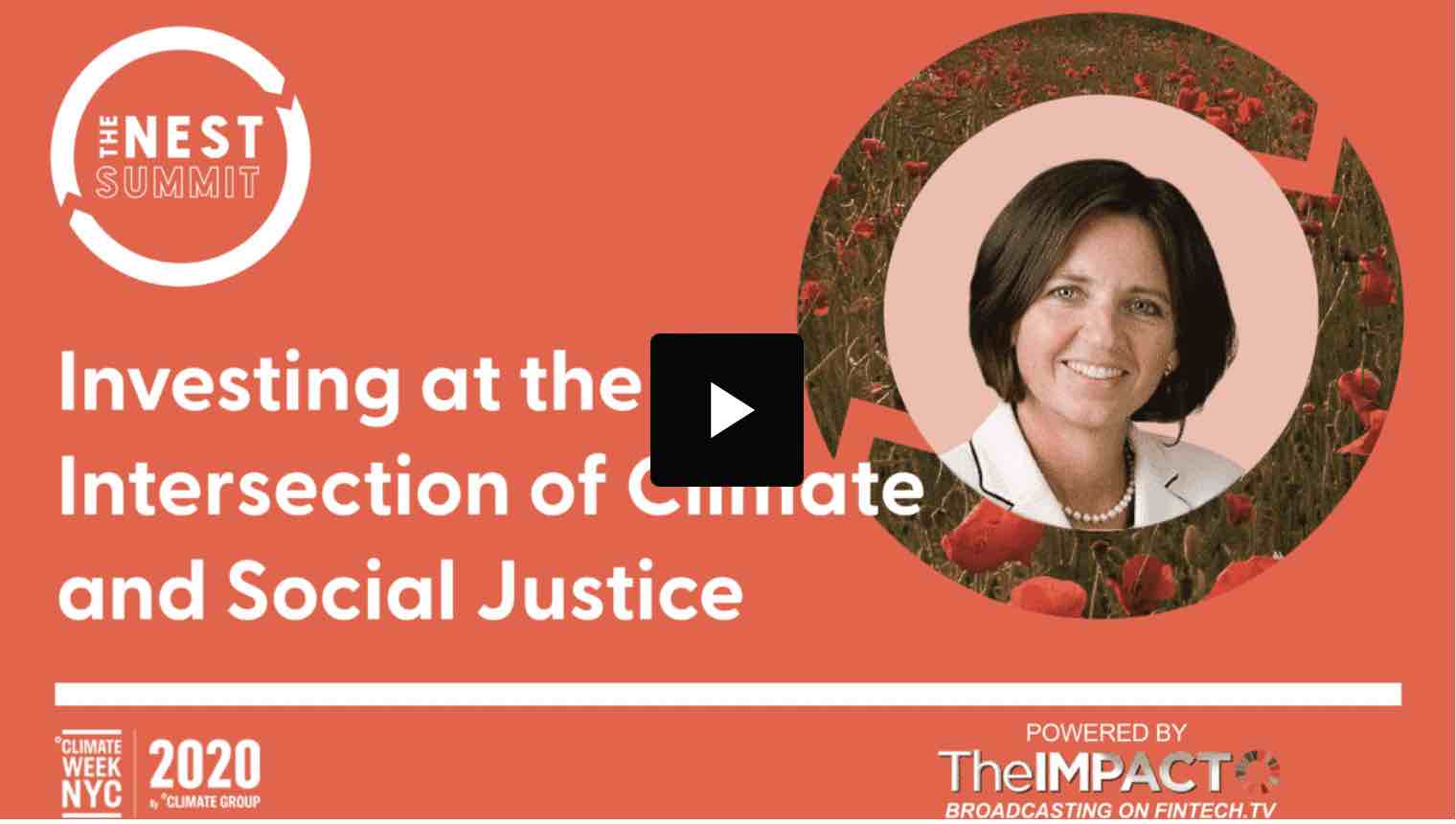
Ivka Kalus of Promethos Capital explains that we cannot have climate justice without social justice, and vice versa. The “S” in ESG can often be overlooked, but the “S” aspect of the analysis (e.g. management team diversity), and employee treatment, directly impact the making of strategic decisions that impact the environment. The same communities that have been most adversely impacted by COVID-19 face negative impacts from climate change. Learn how COVID has exposed societal vulnerabilities that we need to address if we are to effectively prepare for, mitigate, and adapt to climate change.